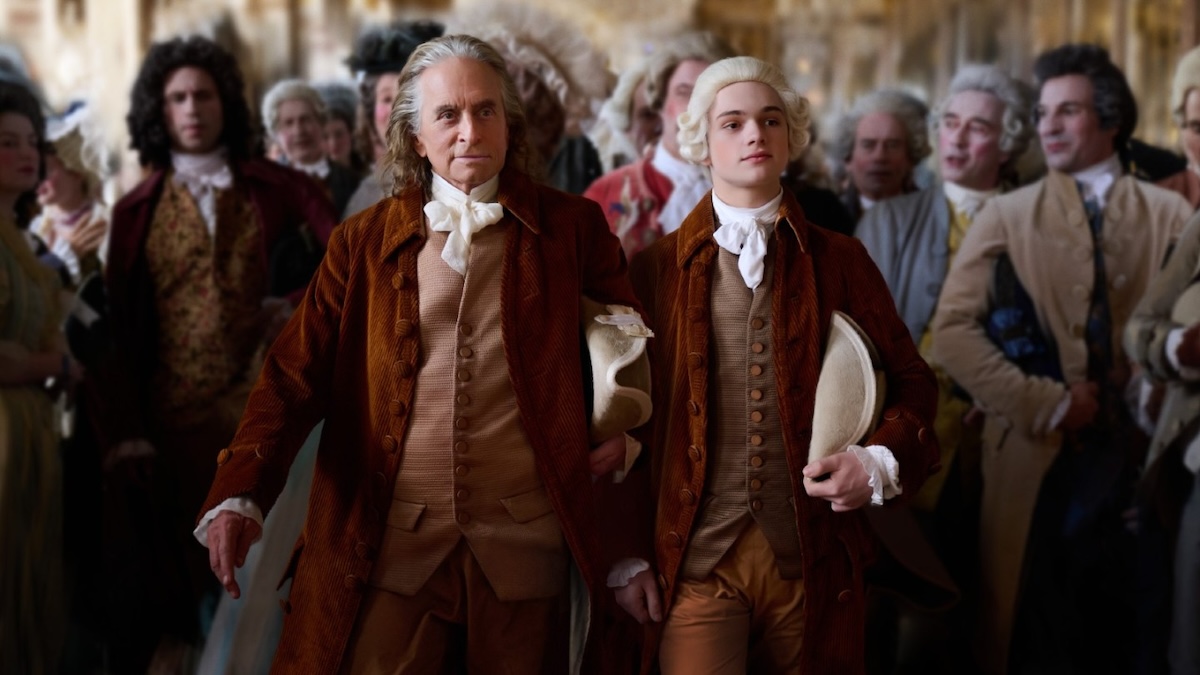The United States’ Office of the Historian “Milestones” webpage “1776–1783: Diplomacy and the American Revolution” devotes one of its eight sections to Benjamin Franklin, “the most distinguished scientific and literary American of the colonial era” and “the first American diplomat.” Franklin is the only person to receive separate notice in “Milestones,” though of course this overview of American diplomacy during the War for Independence includes other prominent Americans such as John Adams and Thomas Jefferson. Franklin’s prominence here is one explanation for the Apple TV+ series Franklin, starring Michael Douglas as America’s “first diplomat.”
What stands out immediately about the show is how little most Americans (this author included) know about the American Revolution despite its mythological status in the nation’s historical consciousness. The series opens with Franklin’s surreptitious arrival in December of 1776 in Nantes. As a signer of the Declaration of Independence, and therefore a rebel, Franklin could have been taken a prisoner by the British if his ship had been captured. This was a conflict, as most Bostonians know thanks to Patriots’ Day and the running of the Boston Marathon, that began more than 18 months before Franklin arrived in France thanks to skirmishes in Concord, Lexington, and Boston between the Sons of Liberty and British soldiers. If the war was old by late 1776, it was also not going well. The British had occupied Manhattan and executed an American spy: Nathan Hale, a 20-year-old lieutenant left behind by George Washington who after being discovered was hanged by the British.
By opening the series with the intrigue of Franklin’s risky voyage and the discouraging news from the United States, Franklin demonstrates dramatically that American independence was no foregone conclusion. However many Americans today, whether inclined to praise or excoriate the country, take for granted a national story that goes from settling a continent, receiving millions of immigrants, and emerging as the “Leader of the Free World, Franklin excels by reminding viewers that American greatness was by no means certain during Franklin’s work in France. The reason is that independence looked far-fetched.
Add to this drama the hostilities between two superpowers, France and Britain, vying for advantage through spies, false diplomatic gestures, rumors of war, proud monarchs and counts courting favors from kings, and you have the ingredients of a riveting TV show—even when you know, no matter how vaguely, the outcome.
The series is not only about the war but also Benjamin Franklin, and on this matter Franklin does not capture how he became an icon in the myths that surround the American Founding. The show introduces Franklin as he is in 1776—a rock star, the man who, in the words of Stacy Schiff, author of the book on which the series is based, “was the best-known American in the world, largely on account of his scientific work.” The French swooned before Franklin the way British colonists in America (including Franklin) had fallen for the evangelist George Whitefield almost four decades earlier. Franklin swag was everywhere in Paris and its vicinity. Images of him wearing his fur cap were commonplace in paintings, engravings, medallions, rings, snuffboxes, and hats. In one episode, John Adams (British actor Eddie Marsan) and Franklin gather (Adams awkwardly) for a sumptuous meal at one of the counts’ homes. The Americans sit at a table set with China plates bearing a cameo silhouette of the Philadelphian. (That incident gave Adams more reasons to loathe Franklin, a sub-theme in this series as well as in HBO’s John Adams, on which Kirk Ellis, a writer on both productions, employed his obvious talents.)
Anyone familiar with Franklin’s remarkable life understands how unlikely his presence in France was as the chief diplomat for the Continental Congress. He was the Horatio Alger of American politics, the underdog who blossomed into Henry Kissinger. He came from a modest Boston family, was indentured to his brother in a printing business, escaped bondage while his brother was in prison, and landed in Philadelphia at the age of 17 (1723). He found odd jobs, some of which took him to London, engaged in sexual alliances that produced an illegitimate son, and finally in 1730 acquired a printing business, the same time that he married Deborah Read. Throughout the 1730s and 1740s, Franklin worked hard and saved harder but was also one of North America’s first community organizers—starting a library, a hospital, a fire department, an order of constables, a militia, a college, and several literary societies. How he had time to conduct experiments is anyone’s guess.
In 1746, two years before he retired from printing, he performed experiments about electricity (including lightning rods) that earned him an international reputation thanks to correspondence with scientists around the world. Immanuel Kant referred to Franklin as “the Prometheus of Modern Times.” Once retired (aged 42), Franklin devoted time to politics and gained a reputation for the art of the deal. His first try at foreign diplomacy came in 1757, when he traveled to England to negotiate a new (royal) charter for Pennsylvania. He failed but began to understand differences between the ways of the Old World and the New.
This brief recap of Franklin’s life makes up for what Franklin leaves out. It also increases the accidental aspect of the production, because if America’s victory in war was surprising, Franklin’s status as a statesman was more so. This is not a criticism of the series, which does not pretend to be a bio-pic. It’s merely a way of recognizing Franklin’s genius, which should not be taken for granted.
Perhaps just as remarkable is the chance to see Franklin interact with American figures who eventually surpassed him in national significance. Franklin is arguably the greatest Founder not to become president (unlike, for example, George Washington, John Adams, Thomas Jefferson, and James Madison). And yet Franklin, at least in comparison to John Adams, showed more savvy with the French than did any of his younger peers. Maybe the reason was age. Franklin was 37 years older than Adams; George Washington, the oldest of the Founders to become president, was 26 years younger than Franklin. But age does not automatically grant wisdom, delicacy, or intuition, skills necessary for effective diplomacy.
For viewers inclined to watch Franklin with news about Gaza or Ukraine on their minds, they may marvel at how crooked the paths are to peace on terms that ensure the greatest return to all parties involved. If Americans today think our diplomats or secretaries of state are not up to this task, who is? Not even institutions like the Kennedy School of Government or a Ph.D. in international relations automatically grants the know-how to negotiate stable relations among nations. Yet Franklin seemed to be especially gifted despite having only a grade school education and limited experience with real power. He clerked for the Pennsylvania Assembly between 1736 and 1750 and was not elected to the Continental Congress until 1775.
Still, Franklin was blessed with charm, wit, fame, a way with words—and used them all to fashion an alliance. After a year of negotiations, on December 17, 1777, Franklin persuaded France’s foreign minister, Charles Gravier, Count of Vergennes, to recognize the United States as a sovereign country. This enabled Americans between 1778 and 1782 to receive from the French supplies, arms and ammunition, uniforms, and troops and naval support for the Continental Army. France also supplied the bulk of the gunpowder used by American militia. The French navy’s strategy, at times debated in several episodes, helped to fend off a British fleet that aided Washington’s forces in Virginia. French support became crucial as well to Britain’s surrender at Yorktown in 1781. Historians estimate that France’s support was the equivalent of $13 billion today. (It also contributed to the financial crisis that led to the French Revolution and execution of Louis XVI.)
Franklin’s time in Passy was not all work, however. In contrast to the plan for moral perfection in his Autobiography (first drafted during this period), Franklin’s activities in France were full of flirtations with countesses (widowed and married); extravagant meals; a steady stream of wine, port, and cognac; and elaborate parties. Whether Franklin was as much the libertine as the show portrays (or as Adams feared), the image of him as the playboy feels anachronistic. Franklin was clearly a flirt and possessed charms that attracted women throughout his life. But as a 70-year-old suffering from gout who needed an ottoman to keep his bum knee raised and lacked the science behind a little blue pill, it’s hard to imagine him capable of the sexual encounters alleged in the show.
In addition to taking the American Founding from the woods and rivers of North America to the salons of French high society, Franklin has an important undercurrent of espionage, secrecy, and the dangers of misplaced trust. His personal secretary in France, Edward Bancroft (Daniel Mays), was a double agent for the British (only confirmed by historians as late as 1889). Some like Bernard Bailyn believe Franklin was sufficiently cunning to sense Bancroft’s double-dealing and used him to leak information to the British that conveyed a closer relationship between Americans and the French than actually existed. This intrigue convincingly adds drama to the plot.
An additional narrative that adds zest even if overdone at times is the youthful exuberance of grandson (William) Temple Franklin (Noah Jupe) as he befriended sometimes debauched French young men, discovers women, succumbs to political idealism, and tries to achieve his personal independence from a patronizing grandfather. Temple’s presence gives the series room to show more of the decadence of elite French society but also slows the main plot’s suspense.
Soap opera-ish aspects in the middle episodes (Temple’s youth and Franklin’s romantic dalliances), however, do not diminish Franklin’s overall success. At a time when social justice advocates have insisted that Americans question almost every storied chapter in the nation’s history, Franklin is a welcome re-creation of the heroism, sacrifice, valor, and underdog beating-the-odds that fueled the American colonists’ unlikely victory over the British. The series even adds luster to the political ideals of republicanism, limited government, and civil liberties. That Hollywood could produce such a positive story of Franklin and the Founding, without an obvious snipe at racism, white privilege, or male toxicity, may be cause to hope that old-fashioned versions of American patriotism are not yet dead.

